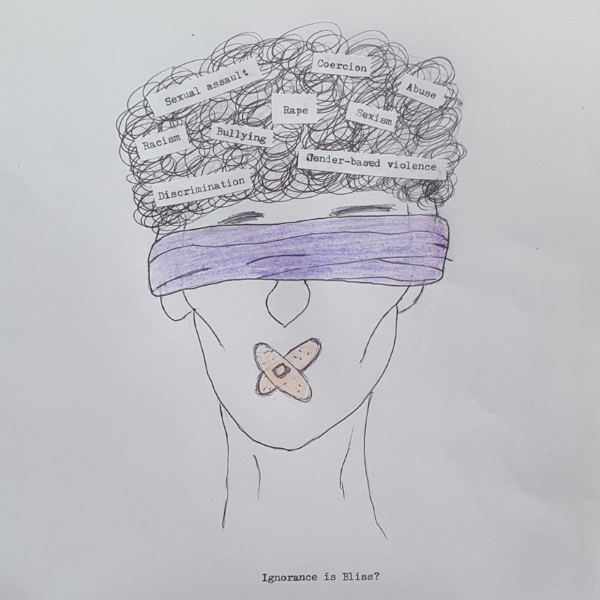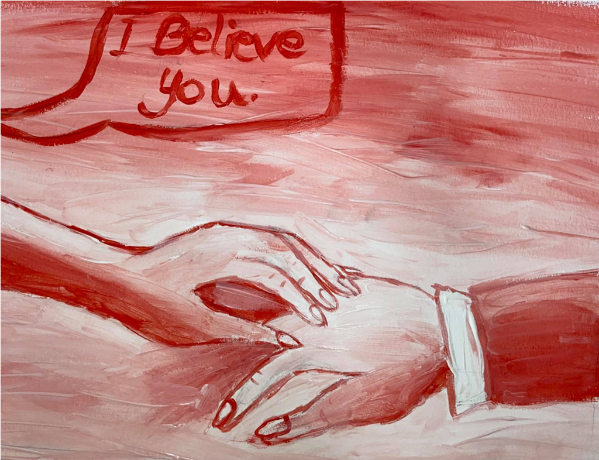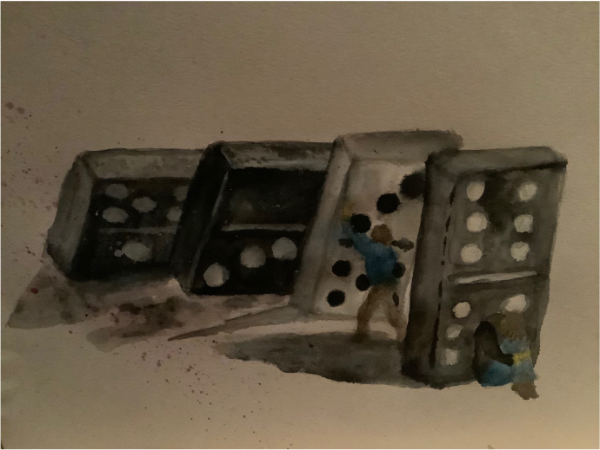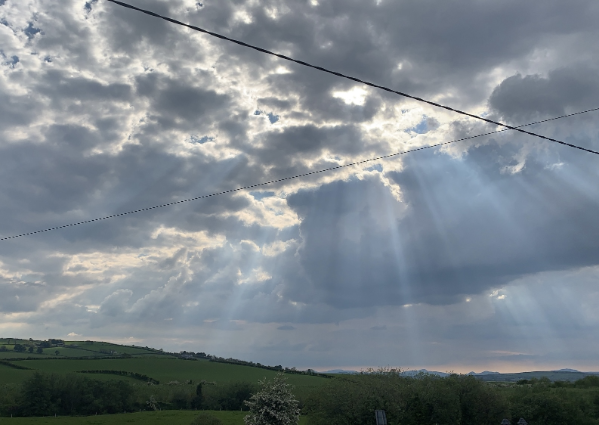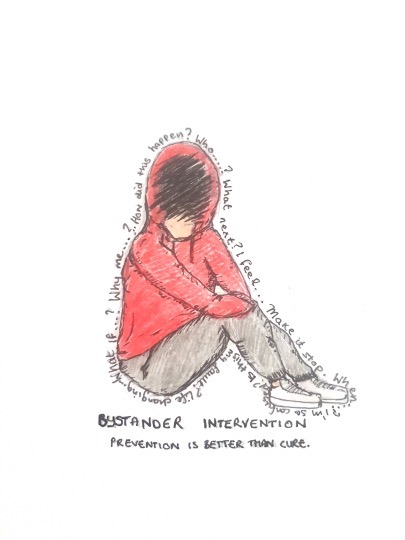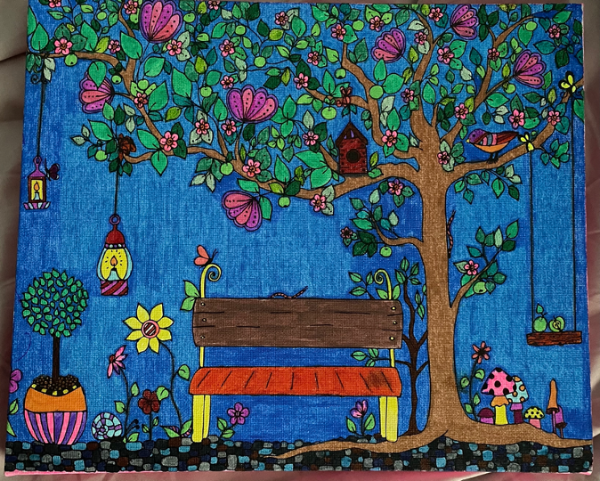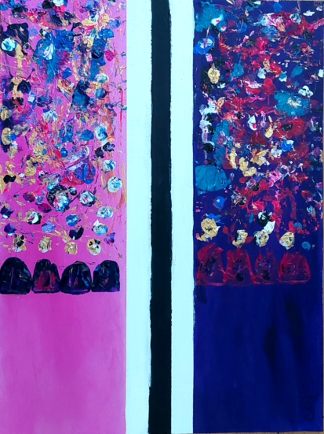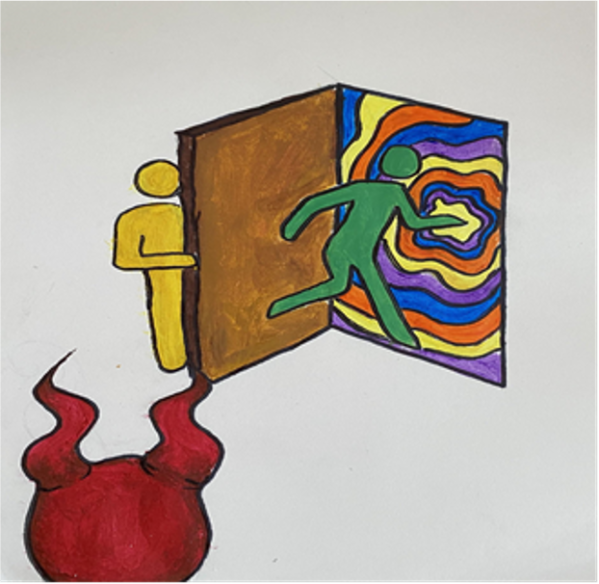This page showcases various reflection pieces, such as testimonials, artwork and poetry, from UCC students and staff who have completed the Bystander Intervention programme.
On this page:
Testimonials & Reflections
As I sit to compose this piece, I wish to firstly acknowledge my experience in taking part in the Bystander Intervention Programme. Part of one of our first-year modules in Applied Psychology had given me an insight in to the programme and was my driving force in committing to undertake the entire programme myself this year, upon having more time. At face value, it may seem that I am just a psychology student acknowledging the relevance of this workshop material in my current field of interest; but it is so much more than that. I am not just a mature student with what feels like a lifetime of engrained acceptance for the tolerance of sexual violence I have experienced or bore witness too, but I am also a mother. I have a one-year-old son who I raise alone and I feel like a programme such as this has so much of a deeper context to me because of the ripple effect it has not just on me, but on me as a parent, me as a sister, as a daughter, as a friend and as an active individual within my wider community. I am determined to raise a child who does not define someone’s worth or purpose on the grounds of any discriminatory construct such as age, gender, race, sexual orientation or their sexuality; to name but a few. I want to raise my child to be a kind and understanding person who will grow up in the understanding that he deserves respect and he must respect others; this is especially true in the aspect of condoning sexually violent or aggressive behaviour and to be a beacon of hope and example toward abolishing “lad culture” and hopefully, not becoming a victim-survivor or perpetrator of any type of sexually degrading behaviour.
This course has given me the opportunity to become an active Bystander and lead by example for those around me. I felt empowered, even in the minutes following my workshops, to be better than I was before I began. The workshops forced me to look within and to analyse some of my own biases that would have existed and to firmly abolish these by confirming what I probably already knew to be true; which was if I am thinking this is wrong, then I am probably not alone in that thought. It was so interesting both academically and personally to hear examples and instances where people become passive and afraid to mobilise themselves against sexual violence because they believe it is the problem of others, of the college, of the government or of society. That very logic turns the belief on its head because on reflection I can say we are all those things too; we are the others, we are the college, we choose the government, we are society; so why would we accept this behaviour any longer when we know in our heart of hearts that there is a growing problem of sexual violence not just in our society, but in our online communities too. Now is as good a time as any to be responsible for making a difference by actioning the change that is needed. I loved when our co-ordinator in workshop 5 remarked “we are the change and we are chipping away at it to make a difference”, and I thoroughly believe that we will.
It seems amazing to me now how many times I have excused my own experiences, even as serious as some were, because I believed that society did not care and that even if others know it is wrong the majority would rule out. I looked at my own social media feeds since and can actually see that us as Proactive Bystanders are more of the majority than we realise. Following the “Me Too” movement, there may have been people who eye rolled or dismissed the cause but look at the millions whose life it changed. Look at the women and men who found the courage and conviction to come forward and stand together for justice, and look at those, how ever few, have been held accountable for their deplorable actions. You may believe that you are just a pebble in a large ocean but when your ripples collide with the ripples of other pebbles, that is when you are capable of making waves. And isn’t that what a programme such as this is capable of doing as well. I see no reason why we can not become a sea of pebbles determined to make waves against excusing sexual harassment, violence and coercive and domestic abuse in our society.
I am incredibly proud of myself for having completed this module; I know that I can be a part of the positive change within our University campus. I know that I will continue to promote the legacy of being an Active Bystander throughout all points of my academic journey, into my future career and indeed, my life overall. I know that partaking in this module has made me a better parent. That for me is the greatest reward of all; I know that I will contribute a human to society who is informed and capable of doing more and being better. I wish for the future of our society to be made up of the next generation of young proactive bystanders and I hope that they will always know that they will always be the majority so long as they speak up for others who feel unable to speak up for themselves.
To those who have co-ordinated this module, and worked tirelessly on its introduction to our campus, I can only commend and thank you for giving students such as myself this opportunity and offer a pledge to your efforts that I will always continue to speak of the good work you have done and promote the positivity I believe has come from being a Proactive Bystander.
As I sit to compose this piece, I wish to firstly acknowledge my experience in taking part in the Bystander Intervention Programme. Part of one of our first-year modules in Applied Psychology had given me an insight in to the programme and was my driving force in committing to undertake the entire programme myself this year, upon having more time. At face value, it may seem that I am just a psychology student acknowledging the relevance of this workshop material in my current field of interest; but it is so much more than that. I am not just a mature student with what feels like a lifetime of engrained acceptance for the tolerance of sexual violence I have experienced or bore witness too, but I am also a mother. I have a one-year-old son who I raise alone and I feel like a programme such as this has so much of a deeper context to me because of the ripple effect it has not just on me, but on me as a parent, me as a sister, as a daughter, as a friend and as an active individual within my wider community. I am determined to raise a child who does not define someone’s worth or purpose on the grounds of any discriminatory construct such as age, gender, race, sexual orientation or their sexuality; to name but a few. I want to raise my child to be a kind and understanding person who will grow up in the understanding that he deserves respect and he must respect others; this is especially true in the aspect of condoning sexually violent or aggressive behaviour and to be a beacon of hope and example toward abolishing “lad culture” and hopefully, not becoming a victim-survivor or perpetrator of any type of sexually degrading behaviour.
This course has given me the opportunity to become an active Bystander and lead by example for those around me. I felt empowered, even in the minutes following my workshops, to be better than I was before I begun. The workshops forced me to look within and to analyse some of my own biases that would have existed and to firmly abolish these by confirming what I probably already knew to be true; which was if I am thinking this is wrong, then I am probably not alone in that thought. It was so interesting both academically and personally to hear examples and instances where people become passive and afraid to mobilise themselves against sexual violence because they believe it is the problem of others, of the college, of the government or of society. That very logic turns the belief on its head because on reflection I can say we are all those things too; we are the others, we are the college, we choose the government, we are society; so why would we accept this behaviour any longer when we know in our heart of hearts that there is a growing problem of sexual violence not just in our society, but in our online communities too. Now is as good a time as any to be responsible for making a difference by actioning the change that is needed. I loved when our co-ordinator in workshop 5 remarked “we are the change and we are chipping away at it to make a difference”, and I thoroughly believe that we will.
It seems amazing to me now how many times I have excused my own experiences, even as serious as some were, because I believed that society did not care and that even if others know it is wrong the majority would rule out. I looked at my own social media feeds since and can actually see that us as Proactive Bystanders are more of the majority than we realise. Following the “Me Too” movement, there may have been people who eye rolled or dismissed the cause but look at the millions whose life it changed. Look at the women and men who found the courage and conviction to come forward and stand together for justice, and look at those, how ever few, have been held accountable for their deplorable actions. You may believe that you are just a pebble in a large ocean but when your ripples collide with the ripples of other pebbles, that is when you are capable of making waves. And isn’t that what a programme such as this is capable of doing as well. I see no reason why we can not become a sea of pebbles determined to make waves against excusing sexual harassment, violence and coercive and domestic abuse in our society.
I am incredibly proud of myself for having completed this module; I know that I can be a part of the positive change within our University campus. I know that I will continue to promote the legacy of being an Active Bystander throughout all points of my academic journey, into my future career and indeed, my life overall. I know that partaking in this module has made me a better parent. That for me is the greatest reward of all; I know that I will contribute a human to society who is informed and capable of doing more and being better. I wish for the future of our society to be made up of the next generation of young proactive bystanders and I hope that they will always know that they will always be the majority so long as they speak up for others who feel unable to speak up for themselves.
To those who have co-ordinated this module, and worked tirelessly on its introduction to our campus, I can only commend and thank you for giving students such as myself this opportunity and offer a pledge to your efforts that I will always continue to speak of the good work you have done and promote the positivity I believe has come from being a Proactive Bystander.
- Laura Kenneally, 2nd year Applied Psychology
Bystander Intervention Programme at UCC and the role of Staff
The Bystander Intervention Programme was a “buzz-phrase” I had heard about and read about a few years ago after it made the headlines. When Dr Louise Crowley introduced the Bystander Intervention programme to UCC in 2016, it became highly recognised as an innovative and effective approach to empowering students to challenge the normalisation of sexual harassment and assault and empowering them to act as pro-social contributors to a safer campus. I remember thinking at the time that this new programme was going to be wonderful, would make a huge impact, but why was it only rolling out to students. I had learned a little about sociology and social theories many years back as a young student, but as I grew older I realised that not only young students should be educated in issues such as ‘Diffusion of Responsibility’ but we all should! Transitioning this module to online delivery and making it widely available on Canvas is now making it accessible to all UCC students, staff and hopefully more will take up this opportunity.
Bystander Intervention.... and Me
I have been a staff member in UCC since 1991, and over the years have witnessed many situations that could potentially put students in danger. A couple of years ago, pre Covid and any social distancing regulations, I was invited to the Clubs and Socs ball. Always a wonderful celebration of students’ achievements, activities and contributions to civic and community engagement, it was also something of a wild party. “Students will be students” they say… “Let them off” they laugh. There was also a preconceived notion that the staff are fuddy-duddies and cannot have any fun. Well, staff can have fun just like anyone else, but like everything in life maturity comes with age, but sometimes with maturity we still may not feel the confidence or the empowerment to act as a bystander in a situation which could potentially end up dangerous.
It was about midnight, and I had made a trip to the bathroom in Rochestown Park Hotel. Dozens of students were out in the hallways, many drunk or under some other influence, many asleep curled up under stairways, and many horrid sounds of vomiting up the night’s consummation of beverages. I could hear moans of almost despair coming from the corner of the Ladies bathroom, and out of the corner of my eye I recognised the face of a female student that I had come to know over the previous few years. She was beautiful, clever, eloquent, engaged in many student activities, well liked, well respected, but this particular night was extremely intoxicated. I could hear her mumbling “I don’t want to go back out there, I don’t want to be with him”. Fellow students laughed, passing remarks about her being “only drunk, you’ll be grand, shur he’s a ride”. Though she was huddled in a corner, and couldn’t stand straight, my heart sank at the thoughts of what could or might happen based on the hushed conversations around me.
Something just sparked within me, that I need to do something, I didn’t realise it at the time, what it was a little intervention that I didn’t realise was an intervention. I literally said “Girls, I think you need to make sure that she drinks enough water, will we head out to the bar area to get some water now?” I went along with her myself and got the water, but also went to a senior staff member to let them know. As staff, we are in a catch22 situation – we can be seen as interfering or nosy, but we also have a duty of care for our students. To date, I am not sure if this intervention prevented anything worse happening that night, but I do know I made the right decision to actually do something, even if it were small.
Bystander Intervention.... and staff
Staff have a unique opportunity in the community to make decisions which will be in the best interest of our students, peers, members of our community. As a manager/leader in a department I think now more than ever, we must encourage other staff members to become aware of the Bystander Intervention Programme. Many of the staff I lead are front line staff who deal with students on a regular basis, often meeting students for one to one sessions, and it is within these sessions that students often acknowledge for the first time of an incident that they are speaking of, in confidence. The student meeting might occur under the guise of a chat about subject choice or a postgraduate qualification… however, with the skills of the staff member and through gentle probing they are able to see a student in trouble. It is then the truth often unfolds. I feel it is very important that staff are given the valuable training and the confidence to intervene in a situation as a bystander and the training and guidance that is given in the five module course has been invaluable to me. It will also be invaluable to staff to be able to make referrals to professional avenues of help for students, but it will also provide that guidance and confidence as a human being that we all need at times, to step in when the time is needed, once safe and secure to do so, and help in a situation that could potentially be much worse if we didn’t.
Conclusion and Recommendation
Reflecting back on the online four modules and the materials available, along with the digital assets and videos, this programme has been really useful for me. Though I was a little nervous and anxious about Module 5 being live and online amongst a younger audience, I actually found that after the first five minutes I settled in quite well. As a suggestion going forward, I think it might actually be really valuable if the Bystander Intervention Programme was rolled out amongst staff teams, perhaps through the HR Staff Wellbeing department, where staff can engage more actively with the materials, and have a follow up session on Module 5 as a staff team. Though a mixture of staff and students can be wonderful and have really positive engagement, I think for the majority of staff it might be a little intimidating being a “student” on the other side of the lens. For me, it was a wonderful experience, and I am so glad I got the opportunity to learn more, it has been really invaluable. Thank you for allowing me to contribute and learn and engage! I hope this programme goes from strength to strength.
From a professional viewpoint, I think Digital Badges and Micro learning qualifications are very progressive. We offer a UCC Works Digital Badge currently in my area, and have submitted an application for a second one – these will be important micro credentials for students to be world ready and work ready going forward!
- Eleanor Donoghue, Head of Career Services, UCC

